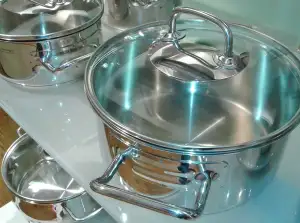The Ultimate Guide to Finding the Best Juicer for Your Home

- Benefits of Owning a Juicer
- Factors to Consider When Choosing a Juicer
- Types of Juicers (Centrifugal, Masticating, Citrus)
- Juicing Speed and Efficiency
- Ease of Use and Cleaning
- Noise Level
- Durability and Warranty
- Price Range
- Top Picks for the Best Juicers in the Market
- Juicer A: High-Speed Centrifugal Juicer
- Juicer B: Slow Masticating Juicer
- Juicer C: Citrus Juicer
- Comparison of the Top Juicers
- Features and Specifications
- Performance and Juice Quality
- User Reviews and Ratings
Juicing has become a popular trend in recent years, with more and more people embracing the health benefits of fresh fruit and vegetable juices. Whether you're looking to boost your immune system, detoxify your body, or simply enjoy a refreshing beverage, a juicer is an essential tool to have in your kitchen. But with so many options available on the market, finding the best juicer for your home can be overwhelming. In this guide, we will take you on a journey through the world of juicers, exploring their benefits and helping you make an informed decision when choosing the perfect juicer for your needs. So let's dive in and discover the wonderful world of juicers!
Benefits of Owning a Juicer
Owning a juicer comes with numerous benefits that can greatly enhance your overall health and well-being. Firstly, juicing allows you to easily incorporate a wide variety of fruits and vegetables into your diet, providing you with an abundance of essential vitamins, minerals, and antioxidants. Juices are also rich in enzymes and phytonutrients that can boost your immune system and improve digestion. Additionally, juicing enables you to consume a larger quantity of produce in one sitting, making it easier to meet your daily recommended intake. Moreover, fresh juices are a great way to hydrate your body and promote detoxification. Lastly, having a juicer at home gives you the freedom to experiment with different flavor combinations and create personalized juice recipes tailored to your taste preferences. Overall, owning a juicer is an investment in your health and offers endless possibilities for delicious and nutritious beverages.
Factors to Consider When Choosing a Juicer
When choosing a juicer for your home, there are several factors to consider. Firstly, you need to decide on the type of juicer that suits your needs. There are three main types: centrifugal, masticating, and citrus juicers. Centrifugal juicers are fast and efficient but may not be as effective in extracting juice from leafy greens. Masticating juicers are slower but can extract more juice and nutrients from fruits and vegetables. Citrus juicers, as the name suggests, are specifically designed for citrus fruits.
Next, consider the juicing speed and efficiency of the machine. If you want quick results, a high-speed centrifugal juicer is ideal. However, if you prefer a slower process that preserves more nutrients, a masticating or slow juicer is a better choice.
Ease of use and cleaning is another important factor. Look for a juicer with simple controls and easy-to-clean parts. Some models come with dishwasher-safe components for added convenience.
Noise level is also worth considering, especially if you plan to use your juicer early in the morning or late at night when others may be sleeping nearby. Masticating juicers tend to be quieter than centrifugal ones.
Durability and warranty should not be overlooked either. Check the materials used in the construction of the juicer and ensure it comes with a warranty that provides sufficient coverage.
Lastly, think about your budget. Juicers come in a wide price range, so determine how much you are willing to spend before making a decision.
Considering these factors will help you find the best juicer that meets your specific needs and preferences.
Types of Juicers (Centrifugal, Masticating, Citrus)
When it comes to choosing a juicer for your home, understanding the different types available is crucial. There are three main types of juicers: centrifugal, masticating, and citrus.
Centrifugal juicers are the most common and popular type. They work by using a fast-spinning blade to extract juice from fruits and vegetables. These juicers are known for their high-speed operation, making them ideal for those who want quick and efficient juicing.
Masticating juicers, also known as slow juicers or cold press juicers, operate at a slower speed compared to centrifugal juicers. They use an auger or gear to crush and squeeze the produce, extracting juice in a more gentle manner. Masticating juicers are great for preserving nutrients and producing higher-quality juice with less foam.
Citrus juicers are specifically designed for extracting juice from citrus fruits like oranges, lemons, and grapefruits. They typically come with different-sized cones to accommodate various fruit sizes. Citrus juicers are simple to use and clean, making them perfect for those who primarily juice citrus fruits.
Each type of juicer has its own advantages and disadvantages, so consider your specific needs before making a decision.
Juicing Speed and Efficiency
Juicing Speed and Efficiency: When choosing a juicer, it's important to consider the speed and efficiency of the machine. Centrifugal juicers are known for their high-speed operation, allowing them to quickly extract juice from fruits and vegetables. These juicers are perfect for those who are always on the go and need a quick fix of fresh juice.
On the other hand, masticating juicers operate at a slower speed, but they are more efficient in extracting juice from produce. They use a chewing or grinding motion to break down the fibers, resulting in higher yields of juice and retaining more nutrients. If you're looking for maximum extraction and nutrient retention, a slow masticating juicer is your best bet.
Citrus juicers, as the name suggests, are specifically designed for citrus fruits like oranges and lemons. They have a specialized cone-shaped reamer that efficiently extracts juice from these fruits. While they may not be as versatile as centrifugal or masticating juicers, they excel in extracting every last drop of juice from citrus fruits.
Consider your lifestyle and needs when deciding on the speed and efficiency of your juicer. If you're always pressed for time, a high-speed centrifugal juicer might be ideal. But if you prioritize maximum extraction and nutrient retention, a slow masticating juicer would be worth considering.
Ease of Use and Cleaning
When choosing a juicer for your home, it's important to consider the ease of use and cleaning. A juicer that is easy to assemble, disassemble, and operate will make your juicing experience much more enjoyable. Look for features such as large feeding chutes that can accommodate whole fruits and vegetables, as this will save you time on pre-cutting. Additionally, opt for a juicer with dishwasher-safe parts for effortless cleaning. Some models even come with specialized cleaning brushes to help remove pulp and residue from hard-to-reach areas. Remember, the easier a juicer is to use and clean, the more likely you are to incorporate fresh juices into your daily routine.
Noise Level
When choosing a juicer for your home, one important factor to consider is the noise level. Some juicers can be quite loud, which can be disruptive if you live in a small space or have sensitive ears. Look for juicers that are specifically designed to operate quietly, as they will produce less noise during the juicing process. This way, you can enjoy your fresh juice without disturbing others or causing any inconvenience.
Durability and Warranty
When choosing a juicer for your home, it is important to consider the durability and warranty of the product. A juicer is an investment, and you want to make sure that it will last for a long time. Look for juicers that are made with high-quality materials such as stainless steel or BPA-free plastic. These materials are more durable and resistant to wear and tear. Additionally, check the warranty offered by the manufacturer. A longer warranty period indicates that the company has confidence in the durability of their product. It also gives you peace of mind knowing that if anything goes wrong, you can easily get it repaired or replaced without any additional cost.
Price Range
When considering a juicer for your home, it's important to factor in the price range. Juicers can vary significantly in cost, depending on their type and features. Centrifugal juicers are generally more affordable, with prices ranging from $50 to $200. Masticating juicers tend to be pricier, starting at around $200 and going up to $500 or more. Citrus juicers are the most budget-friendly option, typically costing between $20 and $100. Remember to consider your budget and the long-term value of the juicer when making your decision.
Top Picks for the Best Juicers in the Market
a. Juicer A: High-Speed Centrifugal Juicer - This juicer is perfect for those who want quick and efficient juicing. With its powerful motor, it can extract juice from fruits and vegetables in no time. It also has a large feeding chute, making it convenient to juice whole fruits without any pre-cutting.
b. Juicer B: Slow Masticating Juicer - If you prefer a juicer that preserves more nutrients and enzymes in your juice, this is the one for you. The slow masticating process ensures minimal heat buildup, resulting in higher quality juice with better taste and texture. It also works well with leafy greens.
c. Juicer C: Citrus Juicer - For those who love citrus juices, this juicer is a must-have. It is specifically designed to extract juice from citrus fruits like oranges, lemons, and grapefruits. Its simple design makes it easy to use and clean, making it a great addition to any kitchen.
These top picks offer different features and functionalities to suit various juicing needs. Consider your preferences and requirements before making a decision on which juicer to purchase.
Juicer A: High-Speed Centrifugal Juicer
Juicer A is a high-speed centrifugal juicer that offers quick and efficient juicing. Its powerful motor spins the blades at high speeds, extracting juice from fruits and vegetables in seconds. This juicer is perfect for those who are always on the go and need their juice fast. It has a large feeding chute, allowing you to juice whole fruits without the need for chopping or pre-cutting. The stainless steel cutting disc ensures maximum extraction of juice, leaving behind dry pulp. With its sleek design and easy-to-use controls, Juicer A is a top choice for those looking for convenience and speed in their juicing routine.
Juicer B: Slow Masticating Juicer
If you're looking for a juicer that can extract the maximum amount of nutrients from your fruits and vegetables, then the slow masticating juicer is the perfect choice. This type of juicer operates at a low speed, typically around 80 RPM, which ensures minimal heat buildup and oxidation. As a result, the juice produced retains more vitamins, minerals, and enzymes compared to other juicers.
The slow masticating juicer uses an auger to slowly crush and squeeze the produce, effectively breaking down the cell walls and extracting every last drop of juice. This method also produces less foam and pulp, resulting in a smoother and more consistent juice texture.
One of the key advantages of this type of juicer is its versatility. It can handle a wide range of produce including leafy greens, wheatgrass, hard vegetables, and even nuts for making nut milk. The slow extraction process also means that the juice has a longer shelf life compared to juices made with high-speed centrifugal juicers.
In terms of cleaning and maintenance, the slow masticating juicer is relatively easy to disassemble and clean. Most models come with specialized brushes to remove any remaining pulp or residue from the auger.
While this type of juicer tends to be pricier than centrifugal juicers, it offers superior performance and quality that makes it worth the investment for serious juicing enthusiasts who prioritize nutrient retention and overall juice quality.
Juicer C: Citrus Juicer
If you're a fan of citrus fruits like oranges, lemons, and grapefruits, then a citrus juicer is the perfect choice for you. This type of juicer is specifically designed to extract juice from citrus fruits with ease.
Citrus juicers come in both manual and electric options. Manual citrus juicers are simple and affordable, requiring you to manually squeeze the fruit to extract the juice. Electric citrus juicers, on the other hand, are more convenient as they do all the work for you with just a press of a button.
When choosing a citrus juicer, consider factors such as its capacity, ease of use, and cleaning. Look for one that has a pulp control feature so you can adjust the amount of pulp in your juice according to your preference.
Overall, a citrus juicer is an essential tool for anyone who loves fresh citrus juices. It's efficient, easy to use, and guarantees that you'll have freshly squeezed juice whenever you want it.
Comparison of the Top Juicers
a. Features and Specifications:
Juicer A is a high-speed centrifugal juicer with a powerful motor and large feed chute. Juicer B is a slow masticating juicer that operates at a low speed to extract maximum nutrients. Juicer C is a compact citrus juicer designed specifically for citrus fruits.
b. Performance and Juice Quality:
Juicer A delivers quick results but may produce slightly foamy juice due to its high-speed operation. Juicer B produces high-quality juice with minimal oxidation, preserving nutrients and enzymes. Juicer C provides fresh and tangy citrus juice without any pulp.
c. User Reviews and Ratings:
Users rave about the efficiency of Juicer A, praising its fast juicing process. Juicer B receives positive feedback for its superior juice quality and quiet operation. Users appreciate the simplicity and effectiveness of Juicer C for extracting citrus juices.
After considering these factors, you can make an informed decision based on your specific needs and preferences to find the perfect juicer for your home.
Features and Specifications
When comparing juicers, it's important to consider their features and specifications. Juicer A, the high-speed centrifugal juicer, boasts a powerful motor that can extract juice quickly. It has a large feeding chute, allowing you to save time on pre-cutting fruits and vegetables. On the other hand, Juicer B, the slow masticating juicer, operates at a lower speed to preserve nutrients and produce higher juice yield. It also comes with various attachments for making nut butter and sorbets. Lastly, Juicer C, the citrus juicer, is specifically designed for extracting juice from citrus fruits with ease. Its reamer size can accommodate different sizes of citrus fruits. Consider these features when choosing the best juicer for your needs.
Performance and Juice Quality
When it comes to performance and juice quality, each type of juicer has its own strengths. High-speed centrifugal juicers like Juicer A are known for their fast juicing process. They can quickly extract juice from fruits and vegetables, making them a great choice for those who are always on the go.
On the other hand, slow masticating juicers like Juicer B operate at a slower speed, which helps preserve more nutrients in the juice. These juicers are ideal for leafy greens and produce higher yields of juice with better taste and texture.
Citrus juicers like Juicer C are specifically designed for citrus fruits such as oranges, lemons, and grapefruits. They efficiently extract every drop of juice from these fruits without any pulp or seeds.
To determine the juice quality of each juicer, it is important to consider factors such as pulp content, foam production, and overall taste. Reading user reviews and ratings can provide valuable insights into the performance and juice quality of different models.
Ultimately, the best juicer for you will depend on your personal preferences and needs. Whether you prioritize speed, nutrient retention, or convenience, there is a juicer out there that can meet your requirements.
User Reviews and Ratings
When it comes to choosing the best juicer for your home, user reviews and ratings play a crucial role in making an informed decision. These reviews provide valuable insights into the performance and reliability of different juicers.
Before finalizing your purchase, take some time to read through customer reviews on reputable websites and forums. Look for feedback on factors such as juice quality, ease of use, cleaning process, noise level, and durability.
Pay attention to any recurring positive or negative comments. If multiple users praise a particular juicer for its efficiency and juice extraction capabilities, it's likely a reliable choice. Conversely, if there are consistent complaints about a specific model's noise level or difficulty in cleaning, you may want to reconsider that option.
Additionally, consider the overall rating of each juicer. A high average rating indicates that most users were satisfied with their purchase and found the juicer to be worth the investment.
By taking user reviews and ratings into account, you can gain valuable insights from real customers who have already experienced using these juicers in their daily lives. This information will help you make an informed decision and find the perfect juicer that meets your needs and preferences.
In conclusion, finding the perfect juicer for your home depends on your specific needs and preferences. If you're looking for speed and convenience, a high-speed centrifugal juicer like Juicer A might be the best choice. However, if you prioritize juice quality and want to preserve nutrients, a slow masticating juicer like Juicer B is worth considering. For those who primarily juice citrus fruits, Juicer C would be the ideal option. Consider factors such as ease of use, cleaning, noise level, durability, warranty, and price range when making your decision. By carefully evaluating these aspects and comparing the top juicers in the market, you can find the best juicer that suits your lifestyle and enhances your juicing experience at home.
Published: 16. 02. 2024
Category: Home



